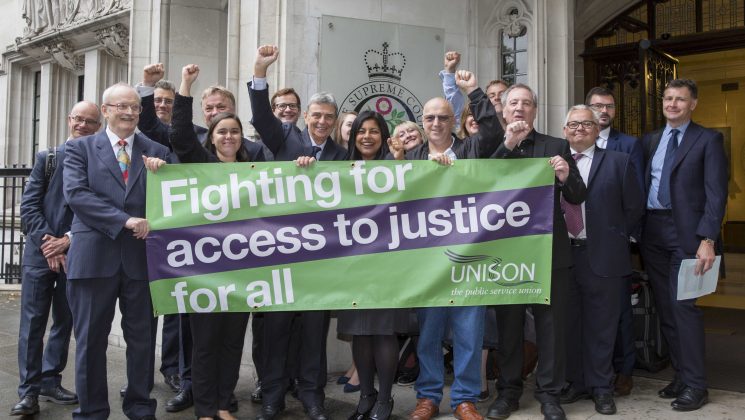At the public sector data blog, we know that data is important. Sometimes data tells you an interesting story, sometimes it reveals hidden truths, and sometimes it wins you a four-year legal battle with the government.
The latter is what happened to UNISON last Wednesday, when the Supreme Court ruled that because of what the data showed, the fees the government made people pay to access employment tribunals were unlawful.
Employment tribunal fees were brought in in 2013 and ranged from £390 to £1200, with further costs for appeals. There was a fee to pay with the initial claim form and another fee before the first substantial hearing.
UNISON believed this would get in the way of workers’ access to justice, so we took the government to court.
If you haven’t read about the case, you can find the whole story here. But for now, let’s do what we do and get into the data.
To win the case, UNISON had to show that the number of people who went to an employment tribunal because they felt their employer had acted illegally was declining. That is exactly what the data showed. And a whole a lot more.
Employment fees came into force on 29 July 2013, and we can see from the chart above that the number of claims dropped immediately. There are certain times of the year when there tend to be more claims, so it makes sense to compare each quarter to the quarter before.
The number of claims from July to September in 2013 was 56% less than in July to September 2012. And from there it just got worse. October 2013 to December 2013 saw a 79% drop on the year before, and April to June 2014 saw an 81% drop from the same period the year before.
It gets more interesting though, because the data is also broken down by the nature of the claim.
There were two cost brackets for employment tribunal fees – type A and type B. Type A are simpler claims and cost less. Type B are more complex claims and cost more. These complex claims include discrimination, and the data shows that there was a huge drop in people making claims related to discrimination.
UNISON’s argument in court used this data to show that the fees were “indirectly discriminatory” because a higher proportion of women would bring discrimination cases. And the Supreme Court agreed, because that’s what the data showed.
It wasn’t just sex discrimination claims that took a plunge either, disability and race discrimination also decreased.
Interestingly there was a spike upwards in the year 2015/16 for a lot of these issues – why is that? Is that because they were accepting more remissions?
We asked Shantha David from UNISON’s legal team, who has been staring hard at this data for the last four years.
“This was partly to do with cases having gone down so low that they couldn’t go any lower,” she said, “and also because trade unions like UNISON were stumping up the fees for their members”
Some other revealing data relates to how much money the fees scheme brought in. One of the stated aims of the system was to recover some funds, but it costs money to set up a new system in the first place, and it costs money to maintain it.
The set-up cost was £5.7 million, and the running cost for 2012 to 2016 was £295,584,000. The amount the tribunals recovered from fees was £27,014,000, which means only 9% of the cost for running employment tribunals and employment appeal tribunals was recovered.
Though the government did introduce a remissions scheme, which meant people on low-incomes who met certain criteria could have their fee waved, the data shows that actually there were a high percentage of people who applied for that but didn’t qualify.
Though we’ll never know how many people had a valid claim against their employer but were put off tribunals because of the fees, the Citizens Advice Bureau carried out research and found that there are cases where people are not eligible for remissions, but the fee level puts the claim beyond their financial reach.
They said in their submission to the government on the impact of fees: “We found that fees are high in relation to how much potential claimants are likely to earn, with 43% of respondents to our survey with income of less than £46 per week after essential outgoings. This includes almost half (47%) of all type B claimants, who would have to put aside all of their discretionary income for 6 months to save the £1,200 fees.”
Research by Acas, the Advisory, Conciliation and Arbitration Service, also found that at least 8,000 people said they couldn’t afford to pay employment tribunal fees and the figures also show that claims dropped off when the second lot of fees were due to be paid for the hearing.
The data clearly shows that charging fees for access to employment tribunals was a bad policy, and thankfully the Supreme Court recognised that and ruled them unlawful.





